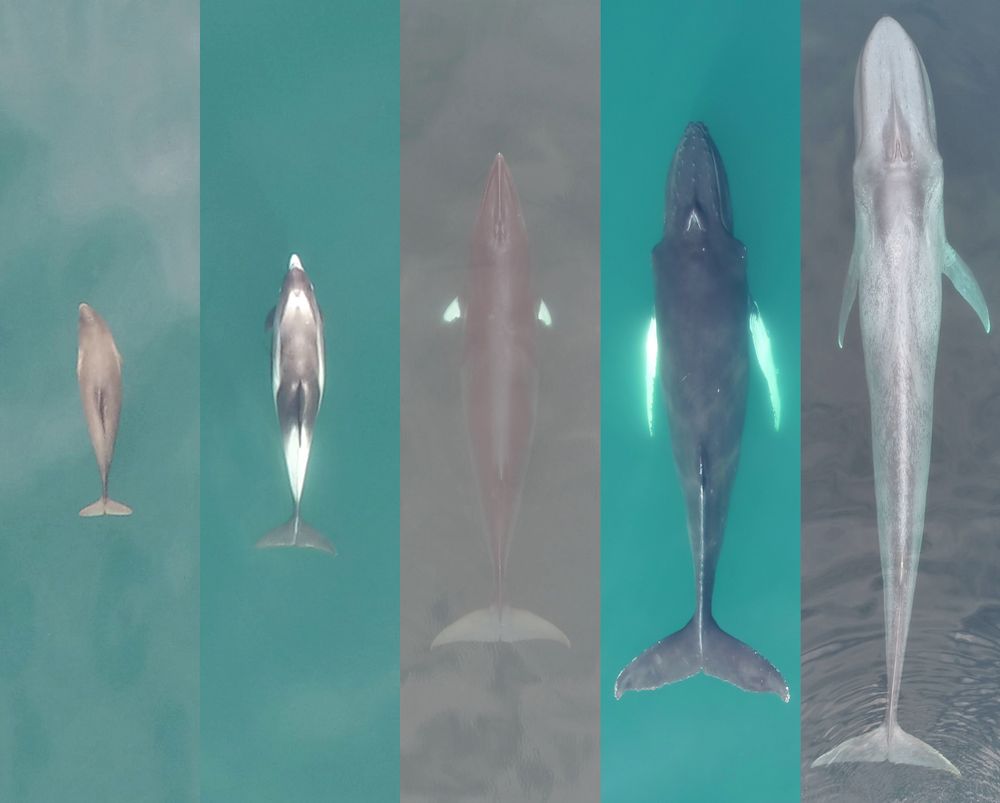
📢 New paper alert! 🐋❄️ How do different-sized #cetaceans stay warm in cold waters? Our latest study in @jexpbiol.bsky.social revealed that smaller species rely on thicker blubber, while larger ones offset heat loss simply by being big. Read more: doi.org/10.1242/jeb.... #UAVs
18.04.2025 19:36 — 👍 9 🔁 3 💬 0 📌 1


Blue whales are a lot skinnier than minke or humpback whales, but their surface area to volume ratio is very low
doi.org/10.1242/jeb....
03.04.2025 05:35 — 👍 8 🔁 1 💬 0 📌 0

Although blue whales are predicted to have high absolute heat loss; when scaled by body volume, heat loss is lower than for minke or humpback whales
doi.org/10.1242/jeb....
03.04.2025 05:42 — 👍 5 🔁 1 💬 0 📌 0
Australian marine mammal researcher and Lecturer in Marine Mammal Science at the University of Western Australia 🐳🐋🐬🦭
We're the world's largest independent non-profit dedicated to ocean research, exploration, and education. Join us!
To protect Antarctica and the Southern Ocean is to protect our future on this planet. In this critical decade for action, our science explores the role of the Antarctic region in the global climate system. Led by @utas.edu.au.
🔗 aappartnership.org.au
Assistant Professor of Biology
interests: biomechanics, ecology, conservation
University of Wisconsin, Green Bay
https://segre-ecophysiology-lab.github.io/
Professor of Quantitative Ecology @ Aarhus University - marine mammals, movement ecology, climate change impacts and agent-based modelling
Whale Scientists is a blog created by early-career researchers to share knowledge about whales and dolphins. Our website aims to be a platform where people from all backgrounds can learn a thing or two about marine mammals.
Father 👦👧, Explorer and Naturalist, often Expedition Leader 🚢 in Polar Areas, daily Deputy Secretary at AMAP 👨💼 | Science-Policy | Arctic ❄ | Antarctic 🐧 | Sailing the seas as often as I can ⛵🌊
Scientific journal publishing research, overview and commentary across all of biology. All of it!
https://www.cell.com/current-biology/home
Part of CellPress @cellpress.bsky.social
Senior researcher at Aarhus University broadly interested in movement ecology and population biology of wild animals on land and in water.
Marine Mammal Foundation. Advancing the natural marine environment through applied scientific research, education and conservation.
🇺🇸➡️🇩🇰 Marine Acoustic Biologist. Special Consultant at @marinemammalsau.bsky.social. Room temperature takes all my own.
Research group at the Sea Mammal Research Unit, University of St Andrews, studying the ecology and physiology of diving animals. Lead by Dr. Chris McKnight and Dr. Jo Kershaw.
Lecturer at @uniofstandrews.bsky.social. Ecophysiologist interested in population health, disease, diving and fasting physiology in marine mammals.
The Aarhus Institute of Advanced Studies at Aarhus University connects and supports free, independent research across all scientific disciplines for scholars from across the world. Follow AIAS for frontier research, events & fellowships.
https://aias.au.dk
Animal Ecophysiologist
Editor in Chief - Journal of Experimental Biology
Based at The University of Queensland, Brisbane, Australia
This lab is damn serious about understanding the ecophysiology of marine mammals 🐳🐬 🦭 and bats 🦇 🧛🏻♀️- mainly through sound 🔉energetics⚡️ and curiosity 🔍✨!
Lead by Prof Peter T Madsen 🥷 @AU.dk
Signal analyst, acoustician, programmer, neurophysiologist, guitarist, bicycle enthusiast and commentor on shit.
Catalan biologist working on marine mammal research and conservation. Director of Ionian Dolphin Project by Tethys Research Institute.
Protecting the dolphins of Monkey Mia and Shark Bay, Australia through research | led by Georgetown University, University of Queensland, and Texas A&M University



